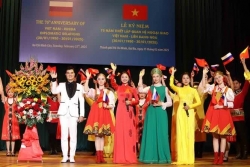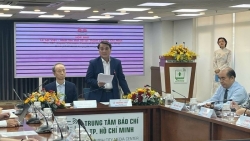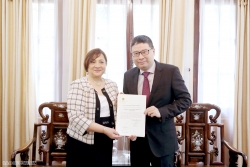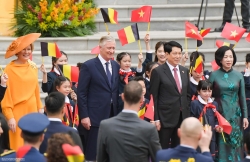
Ho Chi Minh City: 50 years of implementing Vietnam’s foreign policy orientation and new directions for future
Latest
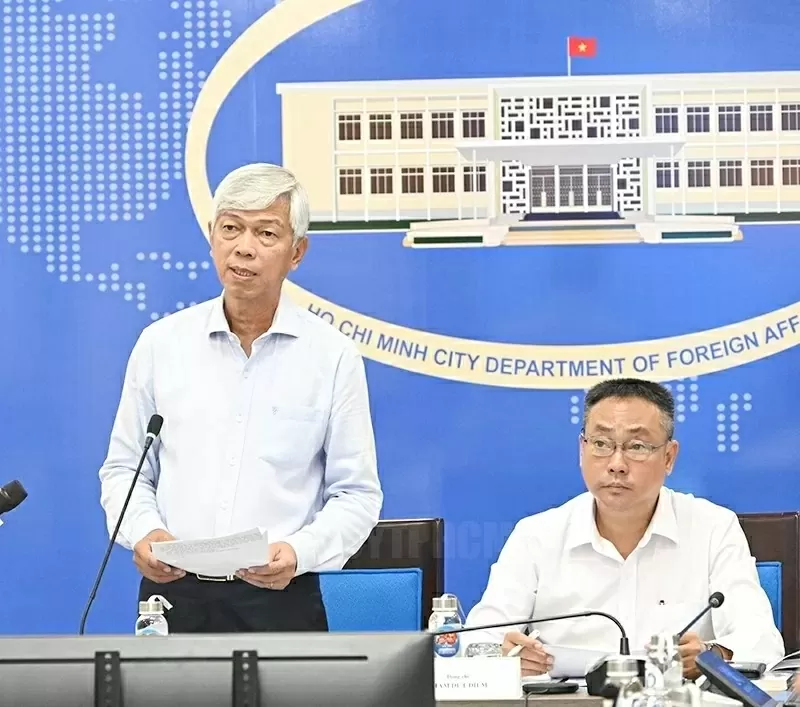 |
| Vice Chairman of Ho Chi Minh City People's Committee Vo Van Hoan speaks at the seminar. (Photo: WVR) |
The seminar was chaired by Vice Chairman of Ho Chi Minh City People’s Committee Vo Van Hoan, Deputy Minister of Foreign Affairs Le Anh Tuan, and Acting Director of the Ho Chi Minh City Department of Foreign Affairs Pham Dut Diem. Former Chairman of the Ho Chi Minh City People’s Committee Nguyen Thanh Phong also attended, along with experts and scholars from the Fulbright School of Public Policy and Management, the University of Social Sciences and Humanities Ho Chi Minh City, Saigon University, and the Ho Chi Minh City Union of Friendship Organizations, among others.
The seminar aimed to review the role of external relations in Ho Chi Minh City's development since the Doi Moi (Renewal) process, while discussing the achievements, lessons learned, and strategic directions for advancing economic diplomacy, cultural diplomacy, and international cooperation in the new phase.
At the seminar, participants put forward various recommendations to enhance the effectiveness and pioneering role of external affairs work in the city's integration and sustainable development process.
Recognizing the significant and enduring contributions of the Ho Chi Minh City Department of Foreign Affairs, Vice Chairman of the Ho Chi Minh City People’s Committee Hoan commended the department’s proactive, flexible, and innovative approach to conducting external affairs.
According to Vice Chairman Hoan, the Ho Chi Minh City Department of Foreign Affairs has effectively fulfilled its role as a bridge connecting the city with international partners, diplomatic missions, international organizations, and the overseas Vietnamese community, while ensuring close and effective coordination between the local government and the Ministry of Foreign Affairs.
“The Department of Foreign Affairs’ quiet yet effective efforts have significantly contributed to enhancing Ho Chi Minh City’s image and standing on the international stage”, emphasized the Vice Chairman of the Ho Chi Minh City People’s Committee.
Vice Chairman of the Ho Chi Minh City People’s Committee Hoan also affirmed that the municipal government will continue to work closely with central ministries and agencies, particularly the Ministry of Foreign Affairs, to effectively implement a comprehensive and modern foreign policy aimed at sustainable development and serving the interests of people.
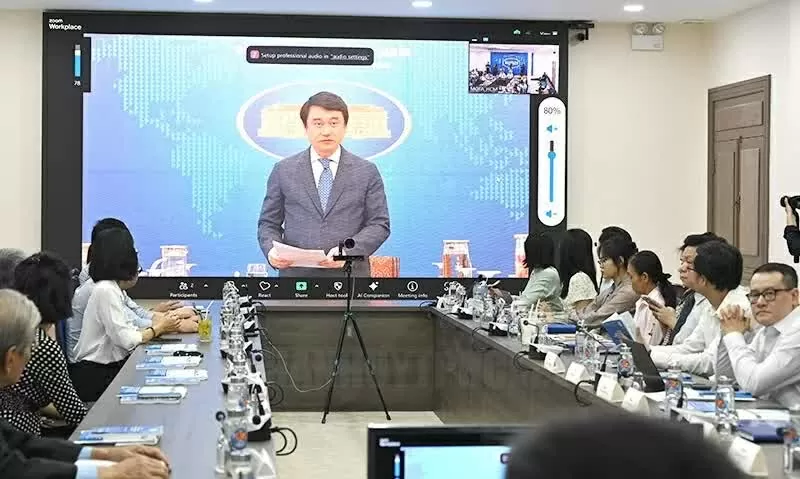 |
| Deputy Minister of Foreign Affairs Le Anh Tuan delivers a message online. (Photo: WVR) |
The seminar featured three in-depth thematic sessions. The first session focused on reviewing the 50-year journey and the city’s significant contributions to Vietnam’s overall foreign affairs. The second session discussed foreign policy strategies for the new period (2025-2045), in the context of emerging global trends such as digital transformation, sustainable development, and non-traditional security challenges. The third session provided an open academic forum where experts and former leaders engaged in constructive and critical discussions, offering practical recommendations to enhance the effectiveness of Ho Chi Minh City’s local diplomacy in the coming years.
Speaking at the seminar, Mr. Duong Dinh Ba, former Deputy Head of the External Relations Commission of the Ho Chi Minh City Party Committee and former President of the Ho Chi Minh City Union of Friendship Organizations, emphasized that over the past 50 years, under the leadership of the City Party Committee and the People’s Committee, and through close coordination with the Department of Foreign Affairs and relevant agencies, people-to-people diplomacy has made significant contributions to the safeguarding, construction, and socio-economic development of the city named after President Ho Chi Minh.
| More from WVR |
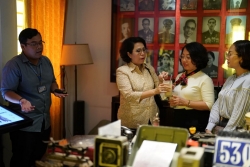 Special tours to welcome Reunification Day in Ho Chi Minh City Special tours to welcome Reunification Day in Ho Chi Minh City |
He also expressed his confidence that the harmonious coordination among Party diplomacy, state diplomacy, and people-to-people diplomacy will continue to strengthen the role of Vietnamese diplomacy on the international stage. This, he noted, will support the country's aspiration to become a developed nation with high per capita income in the region by 2045.
Sharing the same view, Dr. Truong Minh Huy Vu, Director of the Ho Chi Minh City Institute for Development Studies, stated that the history of Vietnam's struggle and creativity has gone through three distinct eras: from the August Revolution of 1945, to the renovation and development process that began in 1986, and currently, the phase of strong advancement, originating from the 14th National Congress of the Communist Party of Vietnam.
In this context, building a modern and effective national governance system is an essential requirement to address the challenges and opportunities of the current era. This not only fosters growth but also demands that each locality enhance its governance capacity and seize new opportunities.
In his comments at the seminar, former Chairman of the People's Committee of Ho Chi Minh City, Nguyen Thanh Phong, acknowledged that during the period of deep integration (from 2000 - 2020), the city had achieved significant milestones in its diplomatic efforts.
However, Mr. Phong also pointed out that there are still many limitations and shortcomings. Notably, Ho Chi Minh City is lacking in terms of strategic direction and does not have a comprehensive and long-term strategy.
"While Ho Chi Minh City is known as a dynamic city, it lacks a consistent image and message to position itself on the international stage, much like how Seoul is recognized as a Smart City or Singapore as a Green Hub", Mr. Phong said, suggesting that Ho Chi Minh City needs a more innovative, modern, and professional approach in its diplomatic efforts.
In his closing remarks at the seminar, Acting Director of the Department of Foreign Affairs of Ho Chi Minh City, Pham Dut Diem, highly appreciated the profound presentations and diverse contributions, which demonstrated that foreign affairs have always been an important and practical part of the efforts to safeguard, build, and develop Ho Chi Minh City over the past half-century. From the period of renovation and open-door integration to the era of actively reaching out to the world, diplomacy has always played a pivotal role.
The seminar also opened up many important directions for the next phase of development, including enhancing the quality of economic, cultural, and public diplomacy, promoting international integration at the local level, and strengthening the city's pioneering role in modern local diplomacy.




